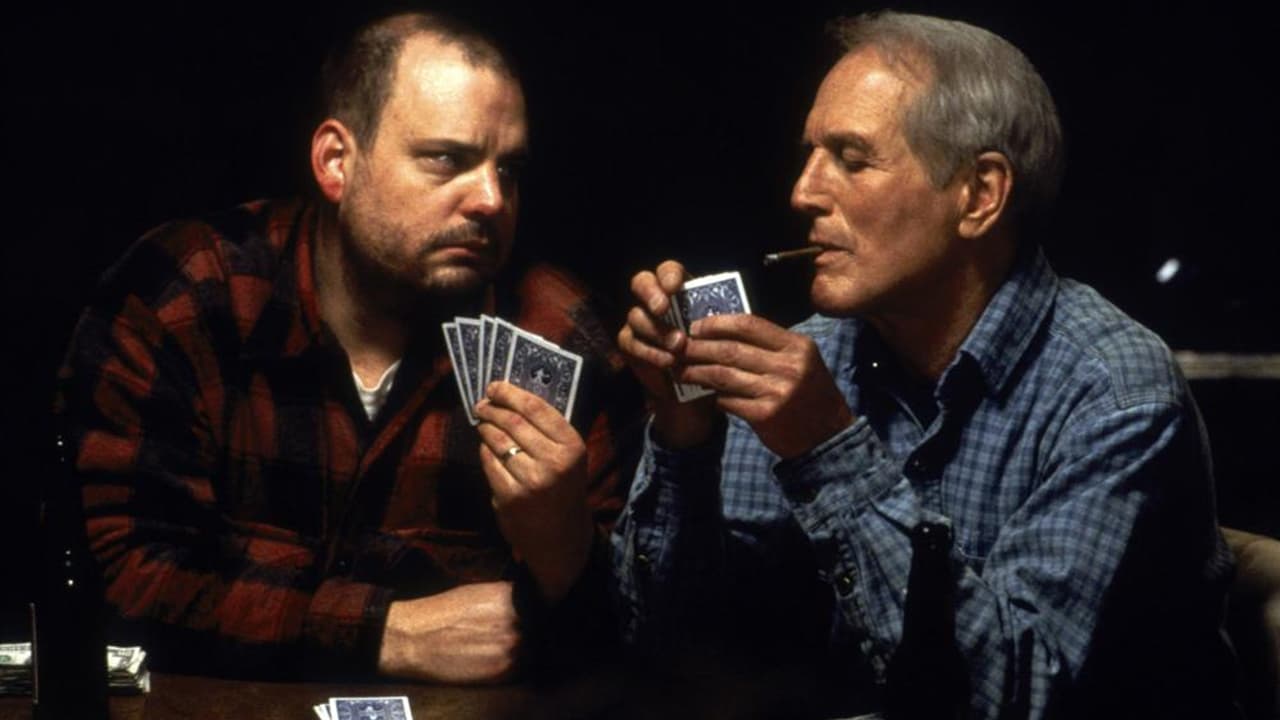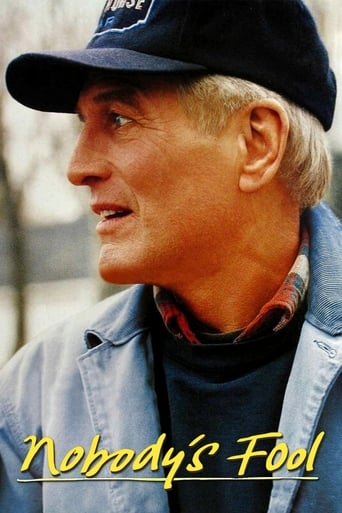BootDigest
Such a frustrating disappointment
Titreenp
SERIOUSLY. This is what the crap Hollywood still puts out?
NekoHomey
Purely Joyful Movie!
Sabah Hensley
This is a dark and sometimes deeply uncomfortable drama
tieman64
This is a brief review of "Nobody's Fool" (1994) and "Twilight" (1998), two films by director Robert Benton, both starring Paul Newman.The better of both films, "Nobody's Fool" stars Newman as Donald Sullivan, an elderly man who lives in small-town America. Perpetually down on his luck, "Fool's" first act watches as Sullivan struggles to claim unpaid wages. For the next hour, things only get worse for Sully: he loses bets, loses money, almost loses his leg, is revealed to be estranged from his family and gets thrown into jail.The film's great joke, though, is that Sully is never sullen. Always giving as good as he gets, Sully repeatedly steals machinery from his boss, and flirts with his bosses wife (Melanie Griffith). As the film progresses, we the audience also begin to appreciate just how many people rely upon the "unlucky" Sully, how lucky they are to have him in their lives, and how upstanding a guy he is when compared to many others in his community.Which is not to say Sully is without flaws. Indeed, "Nobody's Fool's" climax features the usual "improvements" and "reconcilliations" typical of the genre. Sully learns to be a better man, a better father, and attempts to correct mistakes in others he once committed himself. This is all painfully routine. Where the film shines is in Newman's lovable performance, Benton's ceaselessly witty dialogue, and his willingness to sympathise with major and minor characters which lesser films typically villainize.Released four years later, "Twilight" again stars Newman. This time he plays Harry Ross, an ex-cop and one-time private detective. Like "Nobody's Fool", the film's first act watches as Newman damages his leg. Again like "Nobody's Fool", the film then begins to question the impotency and disloyalty of its lead character.Throughout "Twilight", Newman plays a now familiar archetype: the ageing private detective. He's an old timer, washed up, and mocked by all. To make matters worse, everyone believes that Ross lost his penis in a gunfight. Ross' presumed impotency is mirrored to the film's other ageing characters: a washed up actress (Susan Sarandon) in her twilight years, and a dying actor (Gene Hackman), both of whom are friends with Ross. The film's moral dilemma hinges around all three characters. Did Hackman and Sarandon collude to kill a man, is Ross helping them, and more importantly, will he cover-up a murder to protect a friend? To say anymore would be to spoil the fun."Twilight" is set in California, home of many great sun-bleached noirs. It's also home to Benton's earliest noir, "The Late Show", a 1977 feature which starred Art Carny as Ira Wells, an ageing private detective who, like Harry Ross, is accused of being long past his sell-by date. Both films allow their ageing heroes one final blaze of glory. Both films are also unable to transcend the conventions of their genre. "Twilight's" climax in particular is rife with clichés.8.5/10 - See "Cutter's Way" and "Flesh and Bone" (1993).
Ross622
Robert Benton's Nobody's Fool is more than a pretty good film it is a good film, the movie tells the story about a character named Donald Sully a man who is at a rascally ne'er do well retirement age.. While he is pressing a worker's compensation for a bad knee, and secretly works for his nemesis Carl Roebuck, and flirts with his young wife Toby. Sully's long forgotten son and his family have moved back to town for not only for thanksgiving dinner but for Sully's son to spend time with him and so that his father can meet his children. The movie stars Paul Newman as Donald Sully who gets to see his long forgotten family but when he first sees them when he hasn't seen them in a long time. Gets anxiety about unfamiliar family responsibilities. This movie compares to The Descendants by Alexander Payne but in which both of those 2 films have two things in common, more drama than comedy, and one funny part in both. Director Robert Benton copies the directorial style of Alexander Payne with his direction for the movie. The movie also stars Jessica Tandy (who gives an overrated performance.), Bruce Willis ( as Sully's nemesis.), Melanie Griffith (as Roebuck's wife), and Phillip Seymour Hoffman as a police officer in the film. Based on a novel by Richard Russo this was a complete enjoyment for me.
anghmho
Well, maybe two. Or maybe three.Everything was perfect, except for the cinematography. Maybe that was the cinematographer's fault or maybe it was the director's fault. Or maybe it was the editor's.There is a quote from John Ford about why he didn't like to use close-ups. His response: I use them when I think they're necessary, but generally they're all that necessary. Or something to that effect.And he was right. I dare you to name a John Ford film with a lot of unnecessary close-ups.There are are very, very few long shots in this movie. Consequently, you don't get get to see the characters interacting with each other simultaneously. My impression of this film is that is mostly an interminable series of jarring close-ups of 1-2 seconds: close-up of one character saying something, followed by the recipient's reaction, and back and forth ad nauseum. Almost enough to make you sea-sick.Consider the feeling that long shots would have imparted when you watch this otherwise great film, when you could see two or more characters interacting simultaneously. You never get to see that in this film. You get the impression that each actor was hauled before the camera alone to recite their lines and react appropriately, all for a second or two or three, then the camera switches back faster than stink to the character they're supposed to be talking to. Not a long shot to be seen.John Ford aside, consider the way Frank Capra shot films. A Capra-esque feeing about this film has been noted before. Same philosophy as John Ford. When you see James Stewart saying something, you see Donna Reed's reaction at the same time. Long shot.That's what's missing from missing from this movie. Bad framing throughout. It's hard to place the blame: Was it Robert Benton (director), James Bailey (cinematographer), or John Bloom (editor)? Hard to pinpoint.Otherwise a wonderful, if flawed film (reasons noted above).
Richard (richreed-1)
Many reviewers have already cited the excellent acting and the sheer high quality of the movie, so I'll suffice to say I echo their sentiments. I will add that Bruce Willis earns respect as a real actor; his star was well towards its apex when he played this role which could really have been done by many character actors who specialize in playing weasels. Willis took this ordinary supporting role and made it into a very memorable and even likable character.What I love about this film is the story itself, in that Sully Sullivan, an aging handy-man, APPEARS to be struggling with his life and what it meant, when in reality an entire town depends on Sullly to be....well....Sully. He is the thread that weaves the whole town and its many stories together. Even the few people who don't like him depend on him.(Possible spoiler) Toward the end, his son sums it all up and even pays him the ultimate compliment when he says to Sully "It's not easy being you." Simply a great movie on so many levels.

